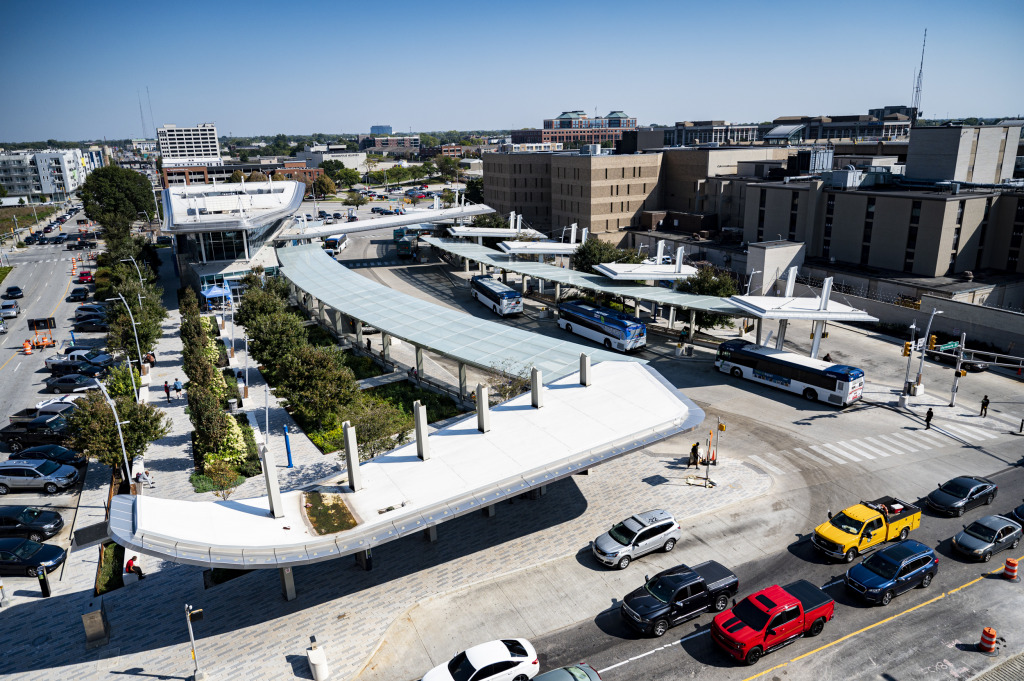Subscriber Benefit
As a subscriber you can listen to articles at work, in the car, or while you work out. Subscribe NowIndyGo’s transportation corporation is suing over $4.7 million in construction cost overruns for the Julia M. Carson Transit Center that it says were caused by an infrastructure consultant’s failure to properly investigate the construction site for potential complications.
The Indianapolis Public Transportation Corp. filed a lawsuit on Friday in Marion County Superior Court against Dallas-based AECOM USA Inc., which has an office in Indianapolis, and URS Corp., which was acquired by AECOM.
Legal representatives for AECOM could not immediately be reached for comment.
The lawsuit says the transportation corporation entered into an agreement with URS Corp. in April 2013. URS was later acquired by AECOM, which was assigned to serve as lead designer for the construction of the Julia M. Carson Transit Center at 201 E. Washington St. in downtown Indianapolis.
As lead designer, AECOM led development of the transit center’s design, which included responsibilities for investigating potentially unsuitable soil on the design site, IndyGo says.
AECOM’s design for the transit center was finalized in July 2014, at which point IndyGo awarded a construction contract to Weddle Bros. Building Group LLC.
When designs were revealed in 2014, IndyGo officials called the hub a $20 million project, but the announced price tag rose to more than $27 million by the time of the center’s opening in 2016. About half the funding was covered by a federal transportation grant.
In November 2014, Weddle began archaeological monitoring of the construction site, and almost immediately found unsuitable soils in the footprint of the proposed building area, according to the lawsuit. Weddle also discovered numerous structures, such as brick and foundation wall remnants, on the site, preventing the company from continuing its work.
Because of the unsuitable conditions of the building site, construction was delayed, requiring more compensation and deadline rescheduling for Weddle, the lawsuit claims.
IndyGo says that for over a year, AECOM led it to believe that the soil on the building site was appropriate for construction.
In addition, IndyGo claims AECOM didn’t inform it that a full data-recovery level archaeological report would have to be prepared for the Federal Transit Administration, which largely funds and regulates IndyGo, until after AECOM finalized its design, also leading to additional costs.
“AECOM ignored all the red flags, and in so doing deprived (IndyGo) of multiple opportunities to make timely, informed decisions on how and when to proceed with the Project, or even proceeding with the Project at this location,” the complaint says. “Ultimately, AECOM’s oversights constitute a breach of the standard of care and of the Contract resulting in millions of dollars of cost overruns to IndyGo–costs that largely were avoidable.”
According to the contract between the IndyGo and AECOM, the project was supposed to be substantially completed in October 2015 but didn’t reach that stage until June 2016. IndyGo says it incurred cost overruns in excess of $4.7 million as a result of AECOM’s actions and failures.
IndyGo is suing for breach of contract, breach of express contractual warranties, and breach of warranty of the adequacy of the plans and specifications. It is seeking damages “in an amount to be determined.”
The case is Indianapolis Public Transportation Corporation v. URS Corporation, and AECOM USA, Inc., 49D13-2410-PL-048814.
Please enable JavaScript to view this content.


Good.
Why 10 years later?
New leadership that actually cares.
Very good question!
Who knows for sure based on this article?. Although I do remember several shortcuts, cost saving decisions, and lack of oversight by IndyGo on the original Redline project, that also cost a few million to fix a second time, all because of IndyGo, not the contractors.
You’re telling me the first time that IndyGo did a bus rapid transit line they weren’t perfect?
Shocked and stunned that a government agency isn’t perfect.
Next you’ll tell me that INDOT closed the downtown interstates for HyperFix in 2003, then had to close it again in 2013 for twice as long because the road wasn’t low enough … yet I don’t see many of you wanting to see everyone fired at INDOT …
Lack of oversight based on what? Which areas specifically. And does this lack of oversight correspond to the construction reporting as required by the Federal Transit Administrations for grant funded projects.
Certainly, IndyGo is not the first, nor last, agency to be subject to cost overruns for insufficient subsurface investigations. In fact, cost overruns for items underground and unseen and unknown are not uncommon. But, the consulting firm, URS at the time, was tasked at reconnaissance.
Why 10 years some may ask. Perhaps because some firms are very good a misrepresenting or “covering their tracks.” That restitution is being sought not is a good thing. And previous administrations should not be blamed as these investigations take time and sufficient evidence must be determined
Accountability is a two way street. IndyGo leadership wasn’t great back in 2019 (which has been addressed), but several contractors also failed to live up to their end of the bargain.
How can any project of that magnitude proceed without the soil testing first coming back clear?
Talk about “dropping the ball”!
IBJ “Journalists”: how many government/RedLine employees were fired for their incompetence?
Any contractor building in downtown Indianapolis knows the soil conditions are crap and anyone building in this area would know they were going to uncover previous buried foundations, trash, and a slew of other impediments to constructing quality foundations. I’m betting IndyGo informed AECOM to proceed with construction and they would cover those expenses as they occurred to get the project started before the funding was withdrawn by the feds.
I would have to agree completely. Even infill residential construction on existing lots in the neighborhoods surrounding downtown plan on finding existing foundations and previously filled in basements. Most of the new homes include a full basement because it is the only way to avoid building on previously disturbed soil.